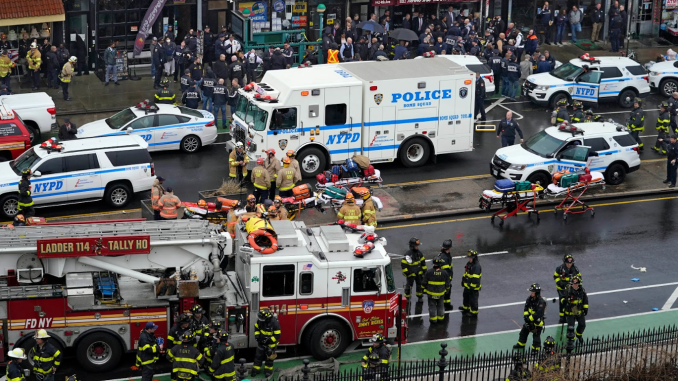
By Ian Ezinga
I’m writing this the day of the shooting that took place at the 36th Street subway station in Sunset Park, Brooklyn – which, as of now, has left at least ten people shot with five of them critically wounded. I am choosing to write this in the space between the event that happened this morning and a few weeks from now where we might be living amongst changes made as a result of the attack.
There are no answers that will make meaningful sense of this tragedy. But I wanted to use this space to share some thoughts – which may be completely devoid of value – on assessing some of the possible hazards of responding to this tragedy. Specifically, I am skeptical that intensifying regulation and further empowering the police force will have a net positive outcome.
For class, I had to read a book by a radical geographer who tried to make the case on why Los Angeles is in severe environmental trouble along the lines of impending earthquakes, floods, and wildfire. In the preceding discussion, my professor asked how we might weigh the sort of hazards detailed in the book against a fact like how more than 38,000 people in the United States die in car accidents each year.
This is not to suggest that the lives lost to tropical storms, seismic events, and raging fire are of less value, but it asks the question of where we assign resources and thought to prevent the greatest loss of life.
Think of the trolley car problem, or meme, where one has to decide which track to send an unstoppable public transit missile down: on the one track there is a single person and on the other track there are five people. The meme was born out of changing the variables of this classic philosophical thought experiment and extracting humor out of the absurd nature of such choices.
But when it comes to public attention, similarly absurd questions are being asked of us. Where might our attention be best spent? What problem should be solved first? Which problems could wait a little longer?
The utilitarian philosophy that gave birth to the meme is one that champions the greater good, whatever the decision is, the desired result should always be one that brings people the most happiness.
The happiness element was at first a confusing emphasis. But I have since supposed that in the myriad of possible scenarios where a tough choice has to be made, happiness is the only common denominator that can serve as a basis for creating a systematic approach to problem solving.
In the case of mass shootings, the answer is not immediately clear. New York City boasts one of the strictest collections of weapon regulations and the largest police department in the country.
While the laws don’t include an outright ban on the owning of firearms, remaining in accordance with the second amendment, I believe the case has been sufficiently made that even if they did and the NYPD’s budget was further augmented, weapons would not leave the city.
When asking what decision would bring about the most happiness, it is not immediately clear to me that increasing the power of the police state would necessarily meet that end. There is a chance that it might, but unlike the trolley car example, the possible outcomes to the tough decisions that need to be made are just not clear.
Since we cannot rewind the suffering of innocent people on their morning commute or extinguish the burden of trauma so many in the city now carry, we can be left feeling powerless in the face of such a tragedy. It seems as though action is demanded of us and something simply must be done to right this wrong.
I agree that this event serves as another reminder that things need to change, but the solution doesn’t lie between two tracks. It can only be found by looking at the entire system of interconnected elements and recognizing that we can’t make decisions based solely on the present.
We have to examine things like our nation’s long and troubled history with firearms as well as the possible consequences of entrusting the solution to the problematic institution that has made many headlines because of its tendency to murder innocent people. On a horrifically consistent basis, police kill more people each year than mass shooters.
While I do believe the answer is found somewhere in further regulation, the question of who is carrying out the enforcement cannot go unanswered. Like almost everyone breathing, I want peace and safety. I leave by asking if we will have more of it by further militarizing police forces?
